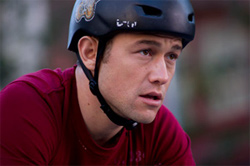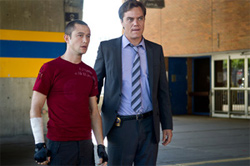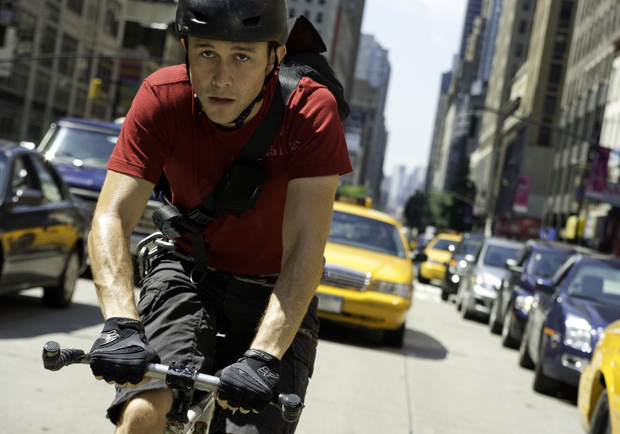It's a familiar TV and movie trope: The first thing we see is a big, climactic moment—a scene of the protagonist in peril, perhaps. How did this happen? How can our hero possibly expect to get out of this mess? What's going on? To answer those questions, of course, the film must rewind the clocks, and, through a lengthy flashback, show us how the story got from Point A to Point B.
When it's done well, this little bit of narrative sleight-of-hand can be an effective tool for showing us how high the stakes, and how thick the suspense. It is not done well in Premium Rush, the new action movie about NYC bicycle messengers. The first thing we see is our hero—Joseph Gordon-Levitt—flying from his bike onto the asphalt ground, presumably after some sort of accident.
When he hits the ground, there is a doozy of a gash on his forearm, but his eyes are open, he's moving around, and his condition is clearly not critical. So is the movie really just the story of . . . how he scraped his arm?

This is not the movie's first red flag; before any images appear on the screen, we hear the opening chords of a familiar Who song, one that has been used to decent dramatic effect on episodes of House and CSI. When something is a cliché on network television, it's probably going to be trite in a motion picture, as well.
The opening salvo is also not the worst part of Premium Rush—but here's the thing: This is not a train wreck of a movie, so transcendently tasteless or misguided that the viewer just can't help but look away. It is also not the kind of movie where there is one big problem—a badly cast actor, maybe, or a cliché-ridden script—that comes to define it. It is simply a movie where nothing works, and the only remarkable thing about it is that so many talented people came up with something so seemingly inept.
It's actually not a bad concept for a movie. Premium Rush is a sort of action-thriller, in which Gordon-Levitt plays Wilee, a bike messenger who feels a strong need for speed, both in his work and in his personal life. Wilee's credo is to never apply the brakes, literally or metaphorically—so when he's handed a mysterious envelope and asked to deliver it across town in just 90 minutes time, he doesn't ask questions. He just starts riding.

Of course, if he actually had stopped to ask a few questions, he may have found out that simply by accepting the envelope he was involving himself with a Chinese crime syndicate, placing himself in danger as a corrupt cop (Michael Shannon) chases him all over New York.
The idea about NYC bike messengers is fresh, but the execution is simply baffling. It's written and directed by David Koepp, who actually has ample experience making Hollywood movies—perhaps most famous for co-writing big hits like Jurassic Park and the first Mission: Impossible.
In Premium Rush, his script sometimes tries for Tarantino-style banter, but it's all so clunky that it never gets off the ground. It is a bad sign when a movie's biggest "punchlines" come from the blunt use of crude terms like "suck it" and "douche bag," but that's the kind of movie this is.
It's not just the writing that's off: Koepp shows an almost complete lack of understanding about how to get the best work out of talented actors. I told my wife before the movie began that, even if it wasn't very good, at least it wouldn't be boring, because Joseph Gordon-Levitt is such a charismatic guy, such a magnetic on-screen presence. But I was wrong; he's given a character who is basically an action figure, an empty bike helmet. He's bland to the point where he doesn't even seem like a human being. It's a stunning squandering of Gordon-Levitt's talents.
That's nothing compared to what happens to Shannon here. He tears into this role with the same kind of slow-burning mania and creeping sense of madness that animated his excellent, award-caliber work in Take Shelter; it's like he thinks he's playing one of the great, iconic screen villains. In another movie, I believe he could have delivered such a role, but reciting this dialogue, it's self-parody.

But even these isolated elements don't fully convey how dreadfully flat the whole thing is. The story is delivered with seemingly no regard for building tension or suspense. Would-be climactic moments are interrupted by incredibly long, awkwardly-paced flashbacks, awkwardly providing exposition and explanation. One scene finds Wilee cornered in a police station, but he escapes simply by ducking into the men's room until the rogue cop goes into the other room. Talk about a missed opportunity.
One of the movie's visual tricks is to occasionally freeze time, allowing Wilee to envision the different paths he might take on his bicycle—allowing us to see the world the way he sees it, as a sort of running GPS. Sadly, it becomes clear early on that there's no path this movie can take that will redeem the time and talent spent here—or even result in anything mildly interesting.
Talk About It
Discussion starters
1. Do you think there is any prudence or virtue in Wilee's "no brakes" worldview? Do you think he comes to regret it, or to learn any lessons from it?
2. How would you characterize the relationship between Wilee and Vanessa? With which character do you think the film wishes for us to sympathize?
3. Do you feel any sympathy or compassion for the young woman whose purchase of the "receipt" begins this entire mess?
The Family Corner
For parents to consider
Premium Rush is rated PG-13 for violence, intense action, and language. The violence mostly consists of bike stunts and the like, but note that there is one rather brutal fight, which results in some fairly gruesome and bloody injuries. The language is quite crass, and includes many swear words, among them one f-word and several misuses of the Lord's name. There are also some crude sexual euphemisms.












